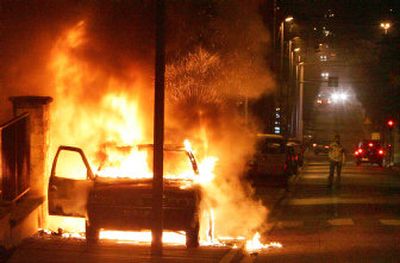Violence rages in French capital

LE BLANC MESNIL, France – Bands of youths roaming Parisian suburbs burned more than 500 vehicles and hurled stones at police Friday, as the worst rioting in a decade entered its second week and spread elsewhere in France. The United States warned Americans against taking trains to the airport by way of strife-torn areas.
A savage assault on a bus passenger highlighted the dangers of travel in the impoverished outlying neighborhoods, where authorities were struggling to regain control.
Attackers doused the woman, in her 50s and on crutches, with an inflammable liquid and set her afire as she tried to get off a bus in the suburb of Sevran on Wednesday, judicial officials said. The bus had been forced to stop because of burning objects in its path. She was rescued by the driver and hospitalized with severe burns.
Justice Minister Pascal Clement deplored the incident, saying it caused him “great emotion.”
With unrest growing beyond the French capital, gangs burned five cars in the eastern city of Dijon and 11 in the southern city of Marseille.
Violence continued into the evening for the ninth night in a row with bullets fired into a vandalized bus and a warehouse set ablaze in the Paris area. In Meaux, east of Paris, police said youths prevented firefighters from evacuating a sick person from an apartment building by pelting them with stones and torching the waiting ambulance.
Some 30 mayors from the Seine-Saint-Denis region, where the unrest started, met Friday to make a joint call for peace. Claude Pernes, mayor of Rosny-sous-Bois, denounced the “veritable guerrilla situation, urban insurrection” that has taken hold.
A national police spokesman, Patrick Hamon, said there appeared to be no coordination among gangs in different areas. But he said youths in neighborhoods were communicating by cell phone, text messages or e-mails – arranging meetings and warning each other about police operations.
The violence started Oct. 27 after the accidental electrocution of two teenagers who believed police were chasing them in the Seine-Saint-Denis region, dominated by low-income housing projects.
Since then, riots have swelled into a broader challenge to the French state and its security forces. The violence has exposed deep discontent in neighborhoods where African and Muslim immigrants and their French-born children are trapped by poverty, unemployment, racial discrimination, crime, poor education and housing.
Across the Paris region, the burned remains of at least 520 cars littered streets, an increase from previous nights. Five police officers were slightly injured by youths throwing stones or bottles, the Interior Ministry said.
At a depot in Trappes to the southwest, 27 buses were incinerated, officials said.
The commuter train line linking Paris to Charles de Gaulle Airport ran limited service Friday after two trains were targeted Wednesday night.
The U.S. Embassy called the protests “extremely violent” and warned travelers against taking trains to the airport because they pass through the troubled area. Russia, meanwhile, warned citizens against visiting the suburbs.
The Foreign Ministry said it was concerned that foreign media coverage was exaggerating the situation. “I don’t have the feeling that foreign tourists in Paris are in any way placed in danger by these events,” ministry spokesman Jean-Baptiste Mattei said, adding that officials were “sometimes a bit surprised” by the foreign coverage.
Still, the violence has alarmed the government of President Jacques Chirac, whose calls for calm have gone unheeded.
“This is the first time (suburban violence) has lasted so long and the government appears taken aback at the magnitude,” said Pascal Perrineau, director of the Center for Study of French Political Life.